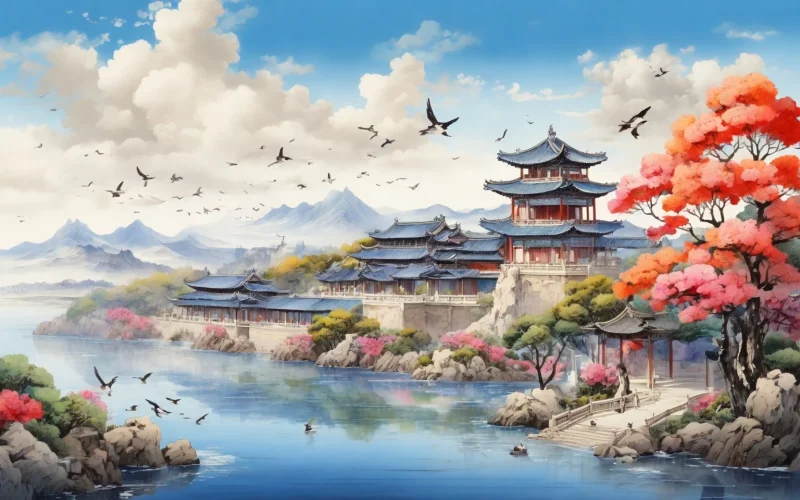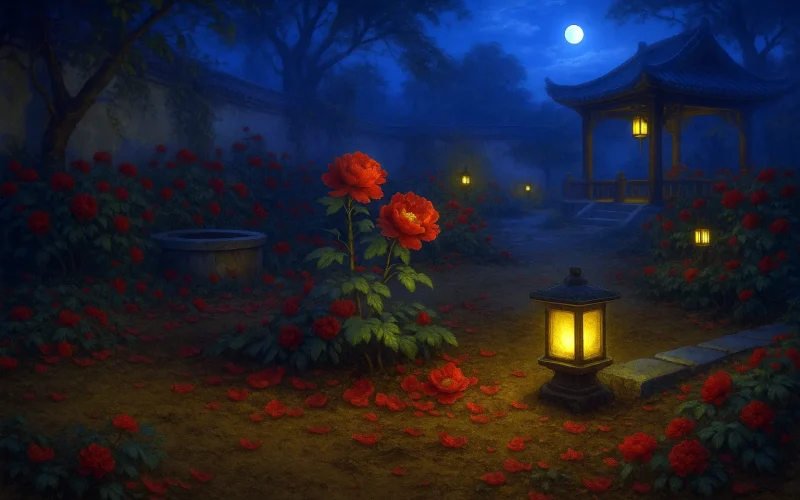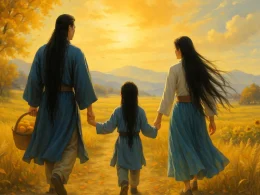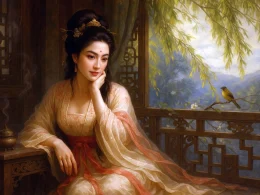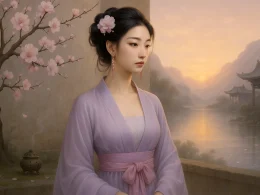A tree of million branches sways in breeze of spring,
More tender, more soft than golden silk string by string.
But in west corner of a garden in decay,
Who would come to admire its beauty all the day?
Original Poem
「杨柳枝词」
白居易
一树春风千万枝,嫩于金色软于丝。
永丰西角荒园里,尽日无人属阿谁?
Interpretation
The background of this poem is closely tied to Bai Juyi’s state of mind in his later years and a court anecdote. It was composed in Luoyang during the Huichang reign period of Emperor Wuzong (841-846 CE). According to Meng Qi’s Anecdotes on Poetry, a court musician once performed lyrics to this tune. When Emperor Wuzong inquired about the "Yongfeng willow," he learned it was in the Yongfeng ward of Luoyang and ordered two of its branches planted in the imperial gardens. While this incident became a charming tale, it served to highlight the poem’s own profound core of compassion. By this time, having weathered the vicissitudes of official life, Bai Juyi possessed a deep understanding of worldly affairs. Using a luxuriant yet neglected willow as a metaphor, he expresses not only the bleakness of his personal late years but also condenses universal reflections on the fate of talent and beauty into twenty-eight characters, creating an unsurpassed object-chanting poem of far-reaching allegorical meaning.
First Couplet: 一树春风千万枝,嫩于金色软于丝。
Yī shù chūnfēng qiān wàn zhī, nèn yú jīnsè ruǎn yú sī.
A tree in the spring wind holds a million hanging strands; / More tender than gold, more pliant than silk, it stands.
The opening uses vivid, detailed description to portray the willow’s supreme vitality and beauty. "A tree… holds a million hanging strands" creates a striking contrast, outlining a lush scene of cascading fronds. "Spring wind" is the source and stage for this life. The second line employs two exquisite comparisons: "More tender than gold" describes the color and moist vibrancy of the new buds; "more pliant than silk" captures the supple, agile texture of the branches. From color to texture, these lines describe the spring willow’s youthful, precious beauty to its utmost, building tremendous potential energy for the dramatic reversal to follow.
Second Couplet: 永丰西角荒园里,尽日无人属阿谁?
Yǒngfēng xī jiǎo huāng yuán lǐ, jìn rì wú rén shǔ ā shéi?
But in Yongfeng’s west corner, a garden left to waste, / All day, no one comes. To whom does it belong, this beauty placed?
The final lines execute a stark reversal. "Yongfeng’s west corner, a garden left to waste" locates the willow in a precisely named yet obscure and neglected spot. "A garden left to waste" forms a cruel contrast with the universal "spring wind" of the opening. The boundless vitality praised earlier now confronts an existential absurdity—it is unseen, unknown. The rhetorical question, "To whom does it belong…?" is the soul of the poem. This is not merely about ownership but an existential interrogation of value: of what worth is such beauty if no one witnesses it? For whom does it exist? The colloquial "whom" (ā shéi) conveys profound poignancy and compassion in its simplicity.
Holistic Appreciation
The artistic power of this heptasyllabic quatrain stems from the immense tension and emotional contrast within its structure. The poem employs a technique of “exaltation followed by dejection.” The first couplet represents ultimate praise, using the most vibrant imagery to elevate the willow’s beauty. The final couplet represents utter dejection, using the bleakest setting to cast it into a void of value. The abrupt transition between them creates a startling effect. The poet constructs a sharp contradiction between perfect life and neglected circumstance, guiding the reader to contemplate a universal proposition: how much beauty in this world fades unseen, overlooked on the margins? Thus, the small poem acquires a parabolic quality, its meaning extending from the willow to talent, ideals, and all unseen beauty.
Artistic Merits
- Originality in Simile: "More tender than gold, more pliant than silk" uses a "more than" structure rather than simple likeness, suggesting a beauty that surpasses even precious worldly standards.
- Symbolic Spatial Setting: The location—"Yongfeng’s west corner"—is specific and symbolic. "Yongfeng" (Eternal Abundance) ironically contrasts with the desolate garden, making the spot an epitome of all places forgotten by the bustling world.
- The Resonant, Open-Ended Question: Concluding with "To whom does it belong…?" without answer leaves vast room for reflection. This touches the deep human need to be seen and to belong, and the anxiety over value unrecognized.
- Fusion of Folk Song Style and Literati Depth: Composing in the Willow Branch Song tradition, a folk-style form, Bai Juyi retains its lyrical clarity while infusing it with profound worldly insight, achieving his ideal of poetry that is both accessible and deeply meaningful.
Insights
This poem uses lucid language to reveal a poignant condition: the isolation of beauty and the suspension of its value. That willow could be the unrecognized scholar, the unappreciated art, or any marginalized yet thriving existence. Bai Juyi’s questioning transcends time: do we only chase splendor in prominent places, neglecting the equally moving scenes in forgotten corners?
The poem argues that genuine appreciation requires looking toward the margins, asking, "To whom does this belong?" It calls for a broader, fairer form of attention. For the individual in the "deserted garden," the poem offers a solace: even if belonging to no one, life can possess the internal abundance of "a tree in the spring wind." Its beauty is first a testament to its own existence. This is both a critique of societal recognition and a quiet affirmation of intrinsic worth.
Poem translator
Xu Yuanchong (许渊冲)
About the Poet
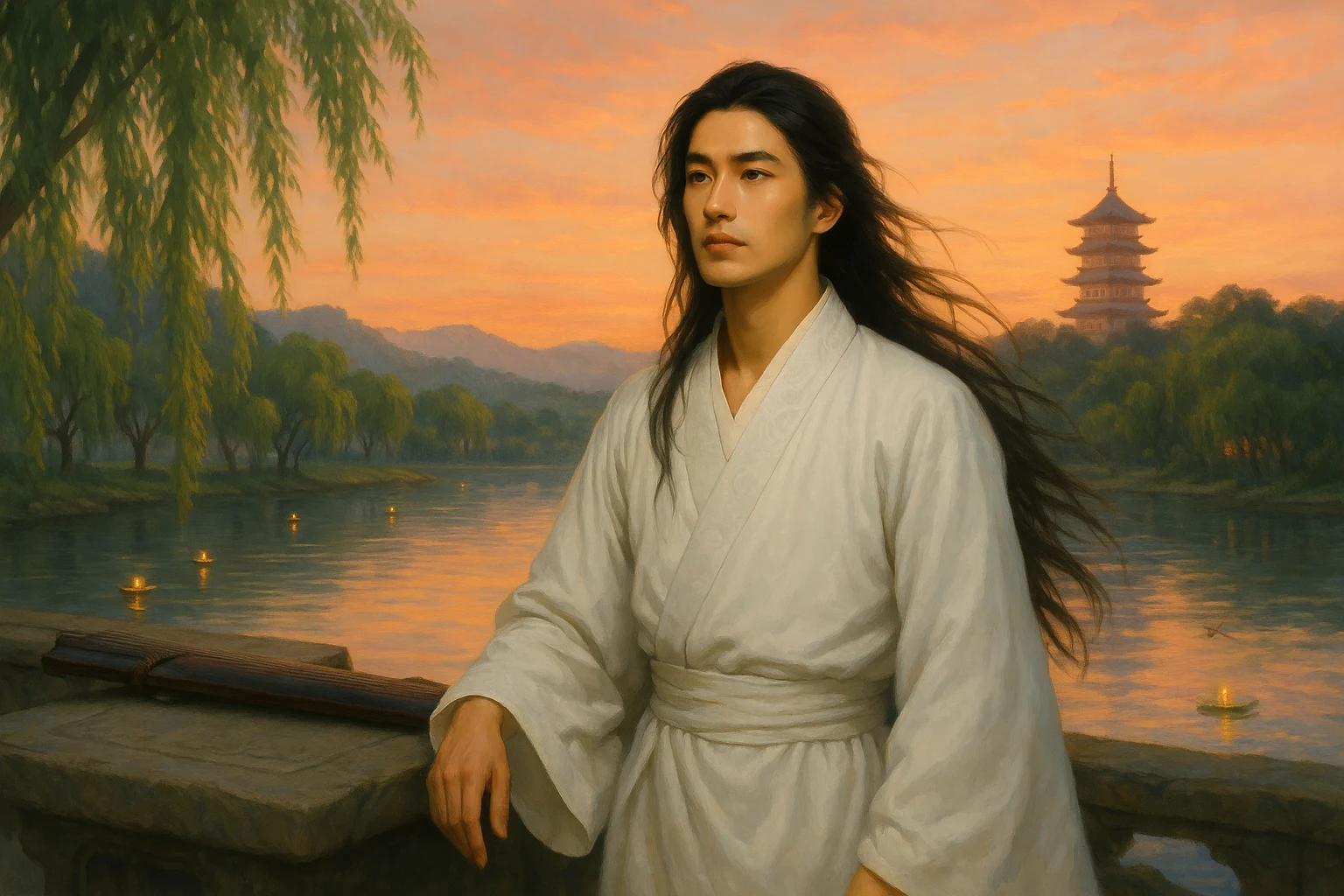
Bai Juyi (白居易), 772 - 846 AD, was originally from Taiyuan, then moved to Weinan in Shaanxi. Bai Juyi was the most prolific poet of the Tang Dynasty, with poems in the categories of satirical oracles, idleness, sentimentality, and miscellaneous rhythms, and the most influential poet after Li Bai Du Fu.







